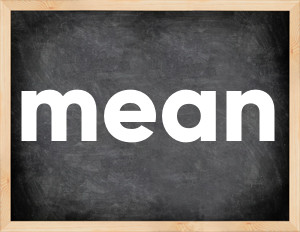 The English verb 'mean' is pronounced as [mi:n].
The English verb 'mean' is pronounced as [mi:n].
Related to:
irregular verbs.
3 forms of verb mean: Infinitive (mean), Past Simple - (meant), Past Participle - (meant).
Here are the past tense forms of the verb mean
👉 Forms of verb mean in future and past simple and past participle.
❓ What is the past tense of mean.
Mean: Past, Present, and Participle Forms
| Base Form | Past Simple | Past Participle |
|---|---|---|
| mean [mi:n] |
meant [mɛnt] |
meant [mɛnt] |
What are the 2nd and 3rd forms of the verb mean?
🎓 What are the past simple, future simple, present perfect, past perfect, and future perfect forms of the base form (infinitive) 'mean'?
Learn the three forms of the English verb 'mean'
- the first form (V1) is 'mean' used in present simple and future simple tenses.
- the second form (V2) is 'meant' used in past simple tense.
- the third form (V3) is 'meant' used in present perfect and past perfect tenses.
What are the past tense and past participle of mean?
The past tense and past participle of mean are: mean in past simple is meant, and past participle is meant.
What is the past tense of mean?
The past tense of the verb "mean" is "meant", and the past participle is "meant".
Verb Tenses
Past simple — mean in past simple meant
(V2).
Future simple — mean in future simple is mean (will + V1).
Present Perfect — mean in present perfect tense is
meant
(have/has + V3).
Past Perfect — mean in past perfect tense is
meant
(had + V3).
mean regular or irregular verb?
👉 Is 'mean' a regular or irregular verb? The verb 'mean' is irregular verb.
Examples of Verb mean in Sentences
- She meant the whole world to him (Past Simple)
- The prize meant a lot to him, not just $1800 (Present Simple)
- I meant the red dress, not the pink one with patterns (Past Simple)
- I didn't mean to hurt you, I was scared myself (Past Simple)
- Nobody wanted to know what it meant (Past Simple)
- I will explain you later what it means (Future Simple)
- Staying chaste meant a lot only couple of centuries ago (Past Simple)
- If only I knew English to understand what it means! (Present Simple)
- A gift from you means a lot to me (Present Simple)
- I'm really angry and I mean it (Present Simple)